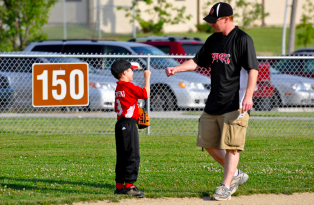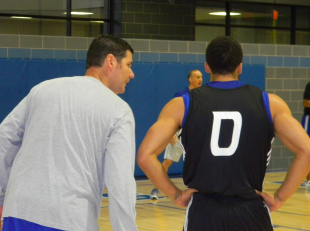Module 1 Lesson 2
The Solution: Transformational Coaching
Listen to the podcast about this lesson
Last week we talked about many of the problems that plague our sports. There is
undoubtedly a great deal of ugliness out there. A recent Goog le search of “youth sports brawl” yielded over 1.2 million hits. The articles, images and videos that depict the dark side of sports are beyond disturbing. The question must be asked, where does all this ugliness come from?
le search of “youth sports brawl” yielded over 1.2 million hits. The articles, images and videos that depict the dark side of sports are beyond disturbing. The question must be asked, where does all this ugliness come from?
There are no simple answers to a question like that. People of all ages are capable of
virtually anything imaginable. However, in examining story after story, there is one common
thread that runs through the vast majority of them. We see adults who have lost sight of the
opportunity to use sports as a tool to develop young men and women.
We have parents who, usually with the best of intentions, place incredible amounts of pressure on their children to perform. In his outstanding book InSideOut Coaching, Joe Ehrmann writes, “I often say that the most competitive sport in America is parenting –
sitting in the stands competing with each other for a better seat in the bleachers of life based on one child’s performance.”
Many coaches would agree with that assessment. Ask these coaches what’s the biggest problem in sports today and you’ll often hear something like, “these parents are absolutely out of control!” Yet coaches are not off the hook. Very few coaches are intentionally positioning themselves as part of the solution. Ehrmann goes on to write, “unless a coach teaches and models character and encourages its development in his/her athletes, it is more likely that organized sports and contemporary culture will…undermine the development of the very character they claim to build.”
If we desire to see transformation of the world of organized sports, if we believe that society-wide we are failing our children, then we must act. And the women and men best positioned to bring about this transformation are our coaches. At Community for Coaches, we confidently assert that a coach who understands his/her purpose will change the world.
Coaches can lay claim to having a greater influence in the lives of more people than just about any group other than parents. There are a few important reasons why this is the case. First, for the vast majority of athletes, they want to play. They would rather be on the field than on the bench. And since my coach controls my playing time, I have to do what he/she says.
Second, as we covered in last week’s discussion, there is no elective activity that involves more young people than sports. Nothing else is even close. So if we are looking to impact the most people, sports is a great way to go about it. And if we are looking for the most influential people in organized sports, coaches are at
the top of the list.
Unfortunately, most coaches fail to embrace the importance of their role. For myself, as a young coach, I had a desire to make a positive difference
in the lives of my athletes, and most people seemed to think I was a pretty good guy. At the same time, I know that for the first 7-8 years of my coaching life,
my primary reason for coaching was the personal satisfaction I derived from winning games and
championships. Please understand, there is nothing wrong with winning games and titles.  Those are
Those are
wonderful, fantastic outcomes. Winning is not the enemy. Prioritizing winning rather than
people is the enemy. How many times have you seen a coach working with young children,
even kids who are 10 years old or younger, get so caught up in a game that he loses his
self-control and berates a child or an official? Why? It’s because winning has become the
priority.
As human beings we all want to feel like winners. That’s a naturally born desire. The question
is how we define winning. How do we define and measure success as coaches? Is it purely
based on wins and losses? For the vast majority of coaches, that is indeed the measure they
use. It’s so convenient. There’s a scoreboard right there on the field or in the gym that tells
me whether I am a winner or a loser. And I want to be a winner. I want the athletes I am
working with to be winners. Nobody wants to feel like a failure.
So if we define success ultimately in terms of winning or losing, 50% of us are failures on any given day. No wonder there is so much ugliness. No wonder there are over 1.2 million Google hits for “youth sports brawl”. Thankfully, there is a better way. The answer is to define success differently. Some will object to this, saying that defining success in terms of character development rather than winning will compromise our opportunities to win and create a generation of “soft” athletes. Nothing could be further from the truth. Athletes whose healthy growth and development is prioritized will feel valued and appreciated for who they are rather than for what they can produce. They will be motivated to put forth their very best effort. They will certainly enjoy their experience more as well, which will also enhance their motivation to practice and play hard. And at the end of the day, we have an abundance of examples of “transformational” coaches who win and win often, without
making winning their ultimate goal.
Legendary college basketball coach John Wooden is perhaps the most obvious example of a coach who won with amazing frequency (10 national championships at UCLA in a 12 year period, including 7 in a row), and yet always understood that winning was not the ultimate goal. To Coach Wooden, winning was a result of his success as a coach, not the defining characteristic of his success as a coach. It’s interesting to note that in Wooden’s definition of success and the often-studied “Wooden Pyramid of Success”, nowhere is winning mentioned.
“Success is peace of mind, which is a direct result of self-satisfaction in knowing that you made the effort to do your best to become the best that you are capable of becoming.”
– Coach John Wooden
Coaches who understand the issues that our sports culture faces and who are committed to seeing those trends reversed must begin to see themselves as part of a nation-wide or even world-wide group of life-changers. Every coach will either be part of the problem or part of the solution. There is no middle ground!
For discussion/reflection:
1. Talk about a coach who made a significant positive impact on your life.
2. What type of motivational tactics have you used that have worked well with athletes?
What has worked poorly?
3. What is your greatest objection, if any, to the idea that each coach is going to be either
part of the problem or part of the solution?
4. What would it look like if most coaches embraced their opportunity to use sports as a life-
changing, transformational tool?

